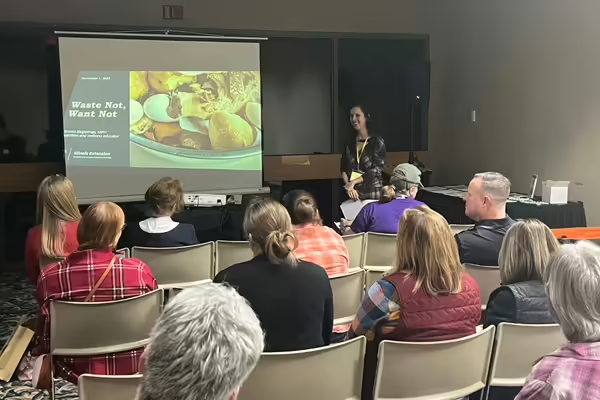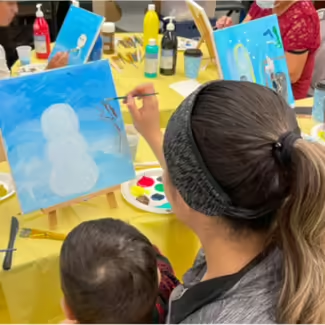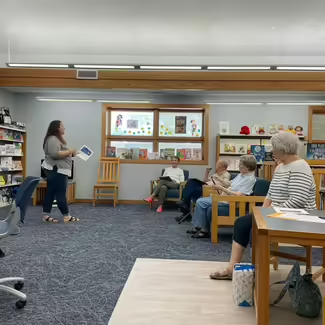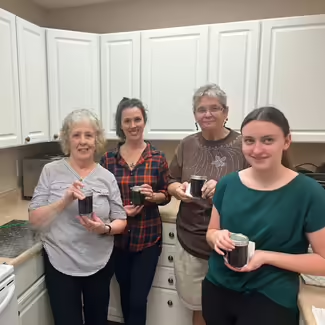
URBANA, Ill. — In line with Illinois' land-grant mission, University of Illinois Extension develops educational programs, fosters knowledge, and builds partnerships to support individuals and communities. In 2023, the team members working in Extension's Family and Consumer Sciences program areas worked with partners to address wellness challenges in northern and central Illinois, launching initiatives that provided communities with resources for healthier, more dignified lives.
Area-specific approaches and both long-lasting and emerging partnerships, enable Extension education to reach and impact older adults, linguistically diverse communities, and rural and metro-region Illinois residents. Extension provides older residents with information on mental health, nutrition, and wellness and addresses the challenges of those most vulnerable to isolation. Spanish-speaking women and children needing wellness and mental health support are also a key area of Extension programming.
Addressing Vital Needs in Illinois Communities
In 2023, Illinois Extension’s Family Life specialists launched high-impact projects and initiatives that helped improve brain health and reduce social isolation in underserved communities in Ford, Iroquois, Vermilion, and Champaign counties. Through educational programs such as "Brain Health-It's a No Brainer!" Illinois Extension reached hundreds of adults with evidence-based education that provided practical strategies to help people achieve mental wellness and promote dignified aging, supporting cognitive health and reducing Alzheimer's-related challenges.
Another initiative in this area was "Don't Go It Alone," a program offered in partnership with local libraries to address social isolation, a growing public health problem, by fostering community connection and improving the mental well-being of locals.
"All the workshops helped me better understand the underlying mental and physical stresses that can lead to other illnesses," said one participant. "I am very grateful for this valuable information; it will benefit me and my family."
In Henry, Mercer, Rock Island, and Stark counties, Kristin Bogdonas, nutrition and wellness educator, worked to promote health education through programs such as "Fit & Strong," in collaboration with the Moline Activity Center, in which many people in the community benefited. At the same time, innovative digital outreach and the popular "Wellness Wake Up Call" podcast provided practical wellness tips to thousands of Illinoisans. The information shared on these digital platforms offers timely news, information, and ideas to promote healthy living in Illinois communities.
In other accomplishments, the "Canning with Confidence" series, a state-led initiative that included a series of videos and webinars, aimed to build confidence in home food preservation by emphasizing science, technology, and safety. It reached hundreds of people, and the team received the prestigious Extension Interdisciplinary State Team Excellence Award for their outstanding contribution.
"After attending this workshop, I began buying in bulk and preserving food at home using all the food I grew at home," said one participant. "This led me to reduce food waste, and I understood it even more when I started getting involved with canning. I plan to start building a worm bin and use the resources she shared from the Extension website."
Promoting Mental Wellness in Linguistically Diverse Communities
In Illinois, Latinas have higher rates of stress and depression than other women. Yet, they are less likely to seek help because of disparities in access to mental health services that may be scarce or difficult to find.
In response, in 2023, Illinois Extension launched the "Stress'n the Arts" series in Cook County, northern Illinois. This series offered a unique combination of health and self-care lessons through music and the visual arts. This innovative, Spanish-language approach helped participants manage stress differently, encouraging self-awareness and the expression of emotions while interacting socially with others.
In Chicago's south suburbs, mothers with young children found the series especially beneficial and fun. It uses expressive art activities and facilitated discussions in Spanish to reduce stress and relieve frustrations. Participants valued the creative techniques and noted that they could easily replicate them at home with their children during difficult and stressful times, redirecting attention to positive experiences. This series provided immediate relief and equipped families with the information and tools necessary for continued emotional well-being.
Helping to Build a Better Family Future in Illinois
Illinois Extension has significantly addressed these communities' mental health and wellness issues through its programs. Driven by a commitment to excellence, inclusion, and transformative education, Extension teams work as catalysts for positive social change, striving to build stronger, more resilient, healthier communities across Illinois.
To learn more about Illinois Extension's Family and Consumer and Science teams programs, visit extension.illinois.edu/family.
WRITER: Herbert Chavez, media communications coordinator, Illinois Extension.
University of Illinois Extension develops educational programs, extends knowledge, and builds partnerships to support people, communities, and their environments as part of the state's land-grant institution. Extension serves as the leading public outreach effort for University of Illinois Urbana-Champaign and the College of Agricultural, Consumer and Environmental Sciences in all 102 Illinois counties through a network of 27 multi-county units and over 700 staff statewide. Extension’s mission is responsive to eight strategic priorities — community, economy, environment, food and agriculture, health, partnerships, technology and discovery, and workforce excellence — that are served through six program areas — 4-H youth development, agriculture and agribusiness, community and economic development, family and consumer science, integrated health disparities, and natural resources, environment, and energy.


